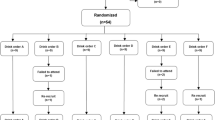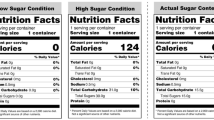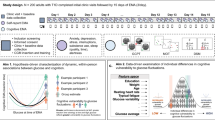Abstract
In an attempt to find out whether decreased blood sugar level is associated with impaired cognitive function, adverse emotional changes, or somatic symptoms, 35 subjects who suspected that they had hypoglycemia were given 5-hr glucose tolerance tests (GTTs). Nine blood samples were taken during the GTT, and the subject's mood, Serial Sevens Test (SST) performance, and somatic symptom reports were recorded on each occasion of sampling. The subjects reported significantly more negative affect and somatic symptoms after glucose nadir than before nadir. SST performance deteriorated at glucose nadir. These effects were more pronounced for subjects with high hypoglycemic index scores than for subjects with low index scores. The impairment in SST performance was greater for subjects who showed rapid decreases in blood sugar than for subjects who showed slow decreases. Dividing subjects by high and low nadirs did not reveal any differences in symptomatology.
Similar content being viewed by others
References
Anderson, R. W., and Lev-Ran, A. (1985). Hypoglycemia: The Standard and the fiction.Psychosomatics 26: 38–47.
Benson, E. A., and Fredlund, P. N. (1985). Disorders of carbohydrate metabolism. In Metz, R., and Larson, E. B. (eds.),Blue Book of Endocrinology, W. B. Saunders, Philadelphia, pp. 286–293.
Brennan, R. O., and Mulligan, W. C. (1975).Nutrigenetics: New Concepts for Relieving Hypoglycemia, M. Evans, New York.
Budd, M. L. (1981).Low Blood Sugar (Hypoglycemia), the 20th Century Epidemic? Thorsons, Northamptonshire.
Burns, T. W., Bregnant, R., Van Peenan, H. J., and Hood, T. E. (1965). Observations on blood glucose concentration of human subjects during continuous sampling.Diabetes 14: 186–193.
Cahill, G. F., and Soeldner, J. S. (1974). A non-editorial on non-hypoglycemia.N. Engl. J. Med. 291: 905–906.
Cataland, S. (1986). The adult hypoglycemias. In Mazzaferri, E. L. (ed.),Textbook of Endocrinology, Elsevier, New York, pp. 666–687.
Cox, D. J., Gonder-Frederick, L., Pohl, S., and Pennebaker, J. W. (1983). Reliability of symptom-blood glucose relationships among insulin-dependent adult diabetics.Psychosom. Med. 45: 357–360.
Hadji-Georgopoulos, A., Schmidt, M. I., Margolis, S., and Kowarski, A. A. (1980). Elevated hypoglycemic index and late hyperinsulinism in symptomatic postprandial hypoglycemia.J. Clin. Endocrinol. and Metab. 50: 371–376.
Hale, F., Margen, S., and Rabak, D. (1982). Postprandial hypoglycemia and “psychological” symptoms.Biol. Psychiat. 17: 125–130.
Hamburger, S., Rush, D. R., and Bosker, G. (1984).Endocrine and Medical Emergencies, Robert J. Brady, Bowie, Md.
Hare, J. W. (1986). Hypoglycemia. In Hare, J. W. (ed.),Signs and Symptoms in Endocrine and Metabolic Disorders, J. B. Lippincott, Philadelphia, pp. 17–27.
Hayman, M. (1942). Two-minute clinical test for measurement of intellectual impairment in psychiatric disorders.Arch. Neural. Psychiat. 47: 454–464.
Hofeldt, F. D. (1975). Reactive hypoglycemia.Metabolism 24: 1193–1208.
Hofeldt, F. D., Dippe, S. E., and Forsham, P. H. (1972). Diagnosis and classification of reactive hypoglycemia based on hormonal changes in response to oral and intravenous glucose administration.Am. J. Clin. Nutr. 25: 1193–1201.
Holmes, C. S., Hayford, J. T., Gonzalez, J. L., and Weydert, J. A. (1983). A survey of cognitive functioning at different glucose levels in diabetic persons.Diabetes Care 6: 180–185.
Johnson, D. D., Dorr, K. E., Swenson, W. M., and Service, J. (1980). Reactive hypoglycemia.JAMA 243: 1151–1155.
Lev-Ran, A., and Anderson, R. W. (1981). The diagnosis of postprandial hypoglycemia.Diabetes 30: 996–999.
McNair, D. M., Lorr, M., and Droppleman, L. F. (1971).Manual: Profile of Mood States, Educational and Industrial Testing Service, San Diego.
Pennebaker, J. W., Cox, D. J., Gonder-Frederick, L., Wunsch, M. G., Evans, W. S., and Pohl, S. (1981). Physical symptoms related to blood glucose in insulin-dependent diabetics.Psychosom. Med. 43: 489–500.
Ruesch, J. (1943). Intellectual impairment in head injuries.Am. J. Psychiat. 100: 480–496.
Russell, P. N., and Rix-Trott, H. M. (1975). An exploratory study of some behavioral consequences of insulin induced hypoglycemia.New Zealand Med. J. 81: 337–340.
Schweizer, E., Winokur, A., and Rickels, K. (1986). Insulin-induced hypoglycemia and panic attacks.Am. J. Psychiat. 143: 654–655.
Uhde, T. W., Vittone, B. J., and Post, R. M. (1984). Glucose tolerance testing in panic disorder.Am. J. Psychiat. 141: 1461–1463.
Yager, J., and Young, R. T. (1974). Non-hypoglycemia is an epidemic condition.N. Engl. J. Med. 291: 907–908.
Young, C. W., and Karam, J. H. (1983). Hypoglycemia and hypoglycemic disorders. In Kaye, D., and Rose, L. F. (eds.),Fundamentals of Internal Medicine, C. V. Mosby, St. Louis, pp. 626–628.
Author information
Authors and Affiliations
Additional information
This research was conducted while the first author held a Medical Research Council Studentship; this assistance is gratefully acknowledged.
Rights and permissions
About this article
Cite this article
Taylor, L.A., Rachman, S.J. The effects of blood sugar level changes on cognitive function, affective state, and somatic symptoms. J Behav Med 11, 279–291 (1988). https://doi.org/10.1007/BF00844433
Accepted:
Issue Date:
DOI: https://doi.org/10.1007/BF00844433




